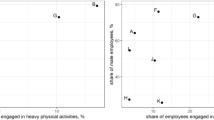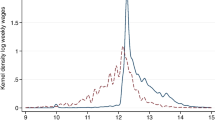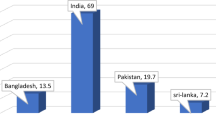Abstract.
In this paper we analyse the bargaining regime wage-effect in Portugal. The results indicate that the bargaining regime coverage is important in explaining the variability of wages. Wage differentials between bargaining regimes are substantial, a fact which may be related to a decentralised wage setting which prevails in Portugal. The highest wages are generated by multi-firm negotiations and the lowest are generated by sectoral contracts. Single-firm contracts align at an intermediate level in the ranking.
Similar content being viewed by others
Author information
Authors and Affiliations
Corresponding author
Additional information
Received: April 2001, Accepted: May 2002,
JEL Classification:
J31
Correspondence to: Pedro T. Pereira
We are very grateful to an anonymous referee. Financial support from program PRAXIS XXI under grant PRAXIS/2/2.1/CSH/781/95 and FEDER is acknowledged. The third author also acknowledges financial support from program PRAXIS XXI under grant BD/3486/94 and from the University of the Azores.
About this article
Cite this article
Hartog, J., Pereira, P.T. & Vieira, J.A.C. Bargaining regimes and wages in Portugal. Portuguese Economic Journal 1, 237–268 (2002). https://doi.org/10.1007/s10258-002-0013-0
Issue Date:
DOI: https://doi.org/10.1007/s10258-002-0013-0




